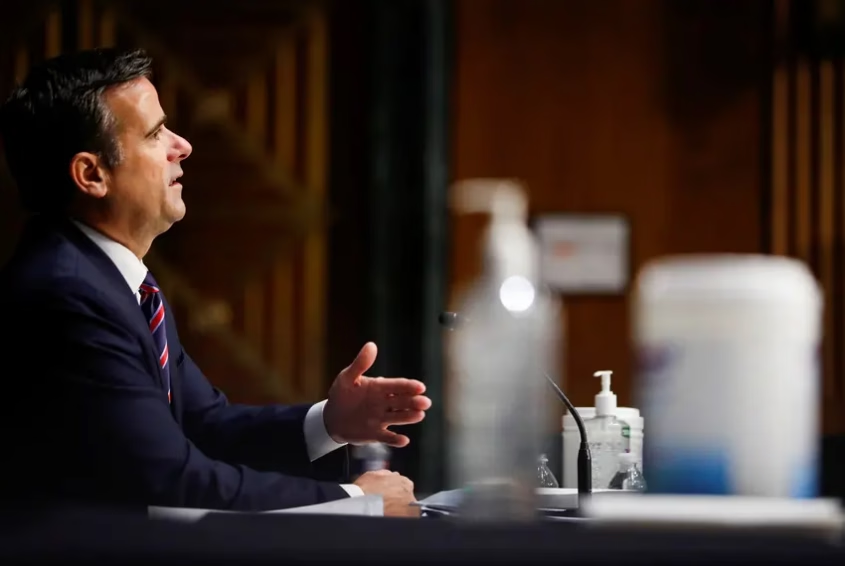by Sam Manas May 19, 2020
The Senate Intelligence Committee moved in a party-line vote Tuesday to advance the nomination of U.S. Rep. John Ratcliffe, R-Heath, for director of national intelligence. The move sends the nomination to the full Senate, which is expected to confirm Ratcliffe in the coming weeks.
This is the second time President Donald Trump has tapped Ratcliffe for the cabinet-level position, which oversees 17 intelligence agencies. Last summer, Ratcliffe’s nod was derailed quickly due to concerns about his political background and questions over whether he inflated parts of his biography. This time, Ratcliffe appears on track to be confirmed, with little ongoing discussion of the major issues highlighted in the last go around.
Acting appointees have filled the job since Dan Coats resigned last summer.
Ratcliffe has long been a vocal ally for Trump. He was a major defender of the president throughout the 2019 impeachment proceedings, in both private and public hearings. He berated former special counsel Robert Mueller, who investigated Russian interference in the 2016 election, when Mueller appeared before the House in July. Ratcliffe argued that Mueller went beyond his bounds when he said the investigation didn’t exonerate the president or determine the president’s innocence.
Axios, when it broke the news that Ratcliffe had been selected, said Trump had been pleased by Ratcliffe’s public, aggressive questioning of Mueller in the hearing.
Shortly after Trump named Ratcliffe as his choice last year, The Washington Post reported that a claim on Ratcliffe’s website that he arrested “over 300 illegal immigrants on a single day” as a federal prosecuting attorney was a significant exaggeration.
The sweep happened at poultry processing plants in 2008, targeting workers suspected of using stolen Social Security numbers. Forty-five workers were charged, and six were dismissed. Two of the cases were dismissed because the defendants were American citizens. One former investigator called the investigation a costly failure. The claim is still on his website.
Ratcliffe, on his congressional website in 2015 and a campaign website in 2016, also stated that he had served as the federal prosecutor in U.S. v. Holy Land, an anti-terrorism financing case that played out over two trials.
A department news release showed Ratcliffe was operating in a supporting role, and people involved with the investigation had no recollection of his involvement with proceedings that led to convictions. A Ratcliffe spokesperson later acknowledged that Ratcliffe had been tasked not with prosecuting defendants, but with investigating the cause of an initial mistrial in the case.
Within a week of his nomination’s announcement, Ratcliffe withdrew from consideration, citing a politicization of what would otherwise be a discussion about his professional experience and defending his record. But then in February, Trump formally nominated Ratcliffe to the position. In a tweet at the time, Trump called Ratcliffe “an outstanding man of great talent.”
Ratcliffe’s supporters have attempted to illustrate his ability to act as an apolitical administrator in response to continuing Democratic concerns. U.S. Sen. John Cornyn, R-Texas, said in Ratcliffe’s confirmation hearing that the nominee was a man of character who understood the difference between being a politician and being an appointed official and who would lead competently and transparently.
Former U.S. Attorney General John Ashcroft wrote in a letter that Ratcliffe would provide decision makers with “fulsome, transparent intelligence.” Retiring U.S. Rep. Will Hurd, R-Helotes, a former CIA undercover agent, also endorsed Ratcliffe, citing his professional experience, “capacity to selflessly lead,” and his understanding of “threats to our security and way of life.”
In his confirmation hearing, Ratcliffe said his initial focus would be COVID-19’s geopolitical and economic impacts. He also said he intends to focus on international security issues, like Iranian military capabilities, 5G cellular technology deployment, North Korean nuclear weapon development, and other cybersecurity and supply chain concerns.
He sought during the hearing to allay concerns of politicization of intelligence gathering. When asked about foreign interference in elections, Ratcliffe said Russia used “active measures” to interfere in the 2016 and 2018 elections and was actively working to do so in 2020. He said that Russia failed to change any votes or influence the election in 2016, and he committed to bringing information on foreign election interference to Congress.
“Keeping politics out of the intelligence community is one of my priorities,” Ratcliffe said.
When pushed to express his views on issues related to the agencies he would administer, however, Ratcliffe often restated his intention to follow the law, saying that director of national intelligence is not a policymaking position.
Ratcliffe was first elected to the House in 2014, at the time replacing Ralph Hall, R-Rockwall, an elder statesman within the Texas delegation. He was reportedly considered as a replacement for then-Attorney General Jeff Sessions. In 2004, Ratcliffe was appointed as a federal prosecutor and chief of anti-terrorism and national security for the Eastern District of Texas. In the same year, he was elected mayor of Heath.
Ratcliffe’s confirmation would open his northeast Texas seat in the House. His name is already set to be on the ballot this November, so a state Republican Party committee would vote Aug. 8 to select Ratcliffe’s replacement in the race. Ratcliffe’s seat is among the most Republican in the country, meaning the candidate the party selects would be the clear favorite in November.
“Senate committee advances nomination of U.S. Rep. John Ratcliffe for director of national intelligence” was first published at https://www.texastribune.org/2020/05/19/john-ratcliffe-nomination-committee/ by The Texas Tribune. The Texas Tribune is proud to celebrate 10 years of exceptional journalism for an exceptional state.






























